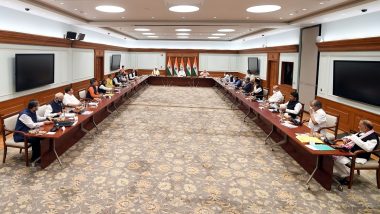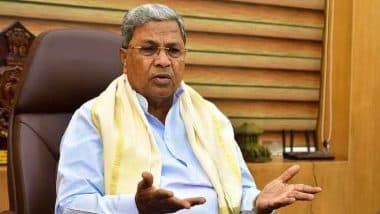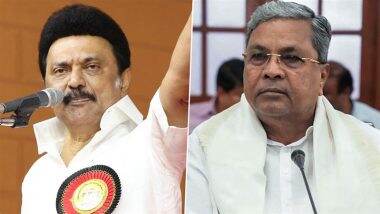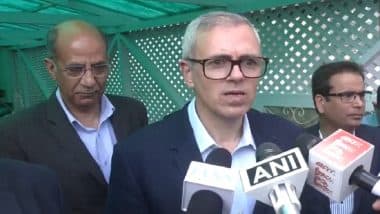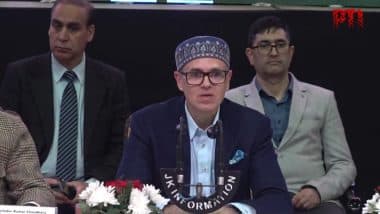New Delhi, June 25: At the first meeting with mainstream politicians from Jammu and Kashmir since withdrawal of the erstwhile state's special status granted under Article 370, Prime Minister Narendra Modi on Thursday stressed on ongoing delimitation process in the union territory. PM Narendra Modi urged leaders from Jammu and Kashmir to participate in the delimitation process asserting that it was important for holding assembly elections. PM Narendra Modi-J&K Leaders Meet: Told PM That J-K People Don't Accept 'Illegal' Abrogation of Article 370, Says Mehbooba Mufti.
"Our priority is to strengthen grassroots democracy in Jammu and Kashmir. Delimitation has to happen at a quick pace so that polls can happen and Jammu and Kashmir gets an elected Government that gives strength to J&K’s development trajectory," PM Modi said. Two major political outfits - National Conference (NC) and People's Democratic Party (PDP) - remain opposed to the delimitation process in Jammu and Kashmir. Jammu & Kashmir Delimitation Commission: EC Official Sushil Chandra Nominated on Panel To Redraw J&K Assembly Seats.
What Is Delimitation?
Delimitation is the process of demarcation of the boundaries of parliamentary or assembly constituencies. Usually, the exercise is carried out after every census to make sure that each constituency has approximately an equal number of voters. The Delimitation Commission, an independent body, is authorised to conduct the politically-sensitive exercise.
Delimitation in Jammu and Kashmir:
The last delimitation exercise was carried out in Jammu and Kashmir in 1995 and based on the 1981 census. There was no census in the erstwhile state in 1991. After the 2001 census, delimitation was due. However, in 2002, the Jammu and Kashmir assembly passed a law putting on hold delimitation till 2026.
Why Delimitation Happening Despite J&K Assembly Law?
Prior to the abrogation of Article 370 in Jammu and Kashmir, delimitation of assembly seats was governed by the Jammu and Kashmir Constitution and Jammu and Kashmir Representation of the People Act, 1957, and that of Lok Sabha seats was governed by the Constitution of India. Post-withdrawal of special status, both assembly and Lok Sabha seats will be demarcated under the Constitution of India.
While withdrawing the special status in August 2019, the Centre had also passed the Jammu and Kashmir Reorganisation Act of 2019. According to one of the provisions of the legislation, the number of seats in the Jammu and Kashmir legislative assembly shall be increased from 107 to 114. Hence, the delimitation process has started.
Why Is Delimitation Contentious Issue in Jammu and Kashmir?
The delimitation is a contentious issue in Jammu and Kashmir mainly because it is directly linked to the representation of Muslim-dominated Kashmir region and Hindu-dominated Jammu region in the legislative assembly. Before the bifurcation of Jammu and Kashmir, the legislative assembly had 111 seats - 43 in Kashmir, 37 in Jammu, 4 in Ladakh and 24 seats remain vacant for Pakistan-occupied Kashmir.
After the Ladakh division separates from Jammu and Kashmir, the total number of assembly seats has come down from 87 to 83, excluding 24 seats for PoK - 107 in total. According to the Jammu and Kashmir Reorganisation Act, 2019, the seats for Jammu and Kashmir assembly will be increased by seven seats, meaning they will go up from 83 to 90 post-delimitation (24 seats will remain vacant for PoK).
If the delimitation happens as per the 2011 census, Kashmir region may get more seats. As per the 2011 census, Kashmir's population is over 68 lakh against 53 lakh in Jammu. However, Kashmir-based parties fear that since the delimitation process would take into account the geographical area of the two regions, the Jammu division could benefit by the creation of seven assembly seats, thereby reducing representation of the Muslim-dominated region in the legislative assembly.
(The above story first appeared on LatestLY on Jun 25, 2021 10:09 AM IST. For more news and updates on politics, world, sports, entertainment and lifestyle, log on to our website latestly.com).













 Quickly
Quickly








